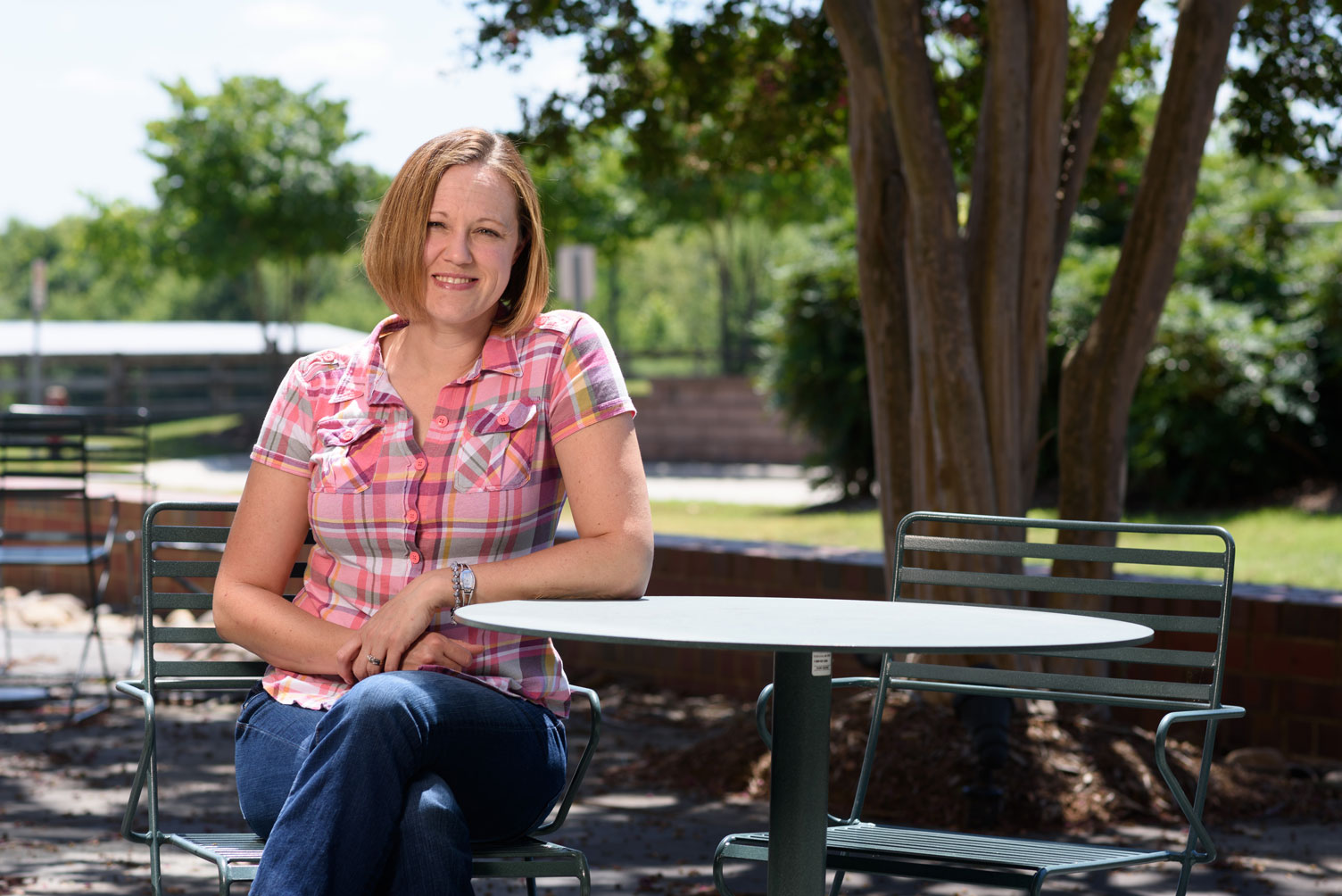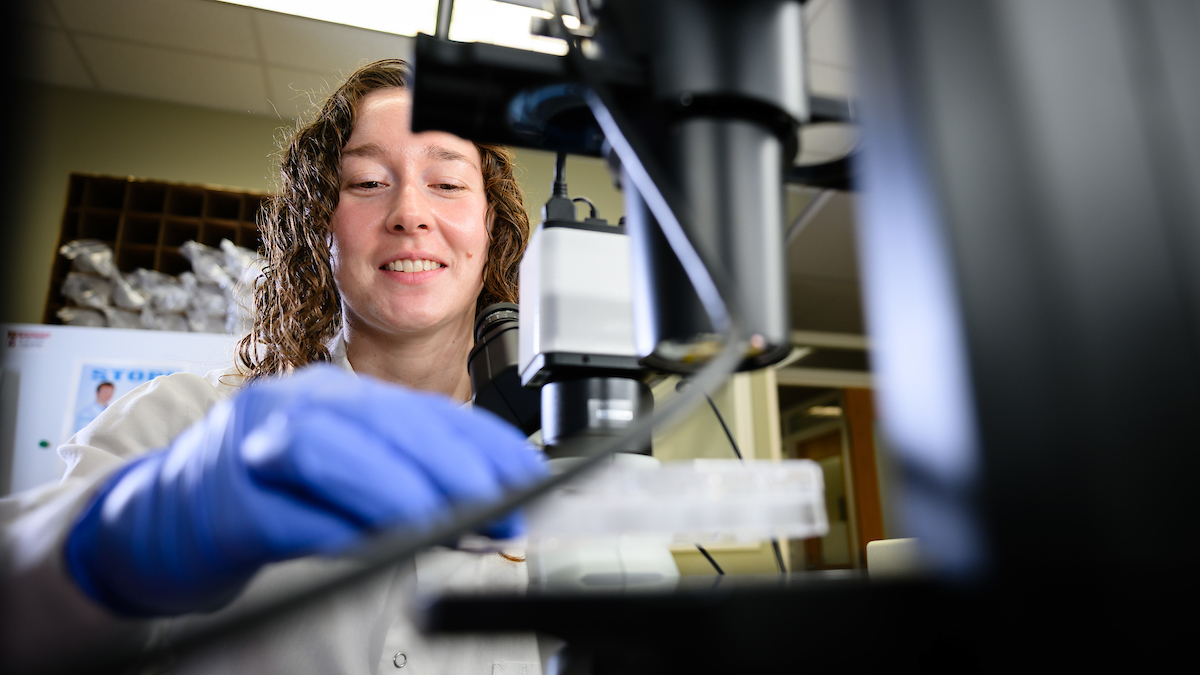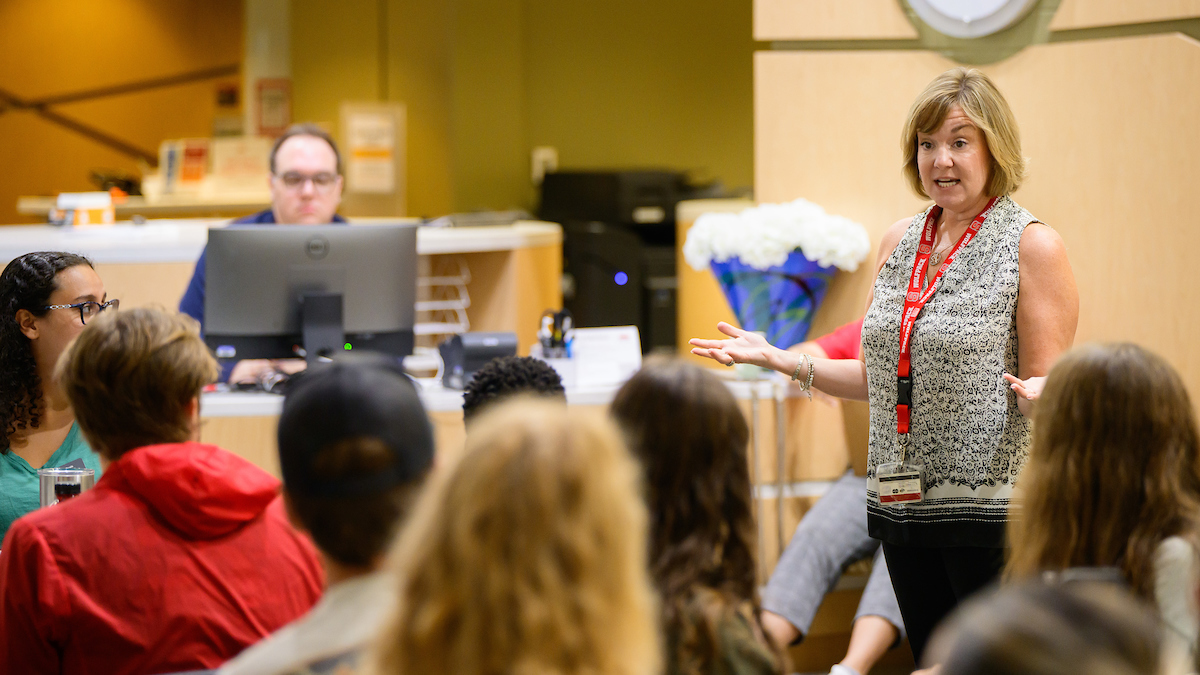Class of 2021: Service and Sacrifice

The dog was mean as could be, and he was hurting.
But he was a soldier with a mission, which meant that Dawn Torrisi had one, too.
Torrisi first saw him when he was brought to the veterinary clinic at Marine Corps Base Camp Lejeune in Jacksonville, N.C., with serious medical conditions that could have easily led to him never being deployed again.
As a veterinary technician with the Army Veterinary Corps, Torrisi had seen many military dogs back from war with the wounds to prove it. She was part of the team that brought the dog to the NC State Veterinary Hospital for emergency care, where he went through three blood transfusions with the Army Veterinary Corps by his side.
Torrisi sat in awe as she watched the hospital staff work to save the dog’s life. She knew then that she wanted to not only do this type of work and that she wanted to do it at NC State.
Six months later, the dog, fully recovered, was deployed to Afghanistan. There, he detected an improvised explosive device, and probably saved the lives of an entire squad of Marines, Torrisi said. The dog came back home safe and as mean as ever, she said.
“That dog was just the most difficult dog to work with,” said Torrisi. “But at the same time we did everything we could to save him. He returned that favor to the Marines he went downrange with.”
The Camp Lejeune veterinary clinic sees dogs with sniffles and dogs with Cushing’s disease, dogs needing amputations and those with diseases in their spinal columns.
The work was often overwhelming, but Torrisi never allowed herself to be emotionally caught up in the difficult details of the moment. It she did, it could mean a dog would not go back out on a mission, not find a bomb and not save a life.
The clinic also saw private pets and Torrisi loved them. But in the military working dogs, she saw a grand purpose in her work.
“I didn’t really have an overwhelming desire to be a vet,” Torrisi said. “But the exposure to the military working dogs and what our veterinarians were able to accomplish, that the dogs could be capable of saving lives based on what we did here at home — it was just a monumental kind of epiphany.
“It was a moment I said to myself, ‘Wow. I want to be able to do more.’”
And as she enters the NC State College of Veterinary Medicine as part of the Class of 2021, that’s exactly what she’s doing.
It’s her new mission.
A Long and Winding Road
You could call Torrisi, 39, a nontraditional student, but that’s not anything new for her. She didn’t join the Army when she was 18 — she joined when she was 28. When she was in basic training, she was 10 years older than every other person there.
Several students start at the CVM in their early 20s, fresh out of undergraduate school. Torrisi was 32 when she started the work needed to apply to vet school. It took her seven years and three different schools to finish her undergraduate degree, all while still on active duty as an Army staff sergeant
“Through my life and career, I have not been the norm,” Torrisi said. “I’m kind of used to being the oddball in the room.”
Torrisi is no-nonsense but effortlessly funny, blunt but tempered with a confidence that never makes her off-putting. She’s approaching the CVM like she would approach an Army mission — with steely resolve and unshakable commitment.
And in a few words, she’s able to put this next chapter of her life into honest perspective.
“I expect a lot of studying, a lot of memorization,” she said, “and I expect it to be easier than full-time work, full-time school and being a full-time mom. I know it’s going to be a lot of work, but I’m used to nothing less.”
When that troublesome but heroic dog — and those at the NC State Veterinary Hospital — inspired her to pursue veterinary school, she had been with the Army for almost seven years, enlisting with the military’s alluring promise to pay for undergraduate studies. She said that she intended to stay with the Army for just four years, get her education paid for and then get out.
[pullquote color=”orange”]“I had a goal and I wanted to reach it. So you sacrifice what you have to sacrifice, but you can’t sacrifice family. You can’t sacrifice the Army, they won’t let you. It’s not in the contract. So you sacrifice your own personal time. And sleep.” [/pullquote]But she soon discovered she loved everything about the Army — the mission, the people, the structure. She loved moving every three years to live somewhere new and try different things. The Army has paid every penny of her undergraduate studies — all seven years of it. She loves the Army so much that she’ll still be in the Army Reserves while in vet school.
Torrisi’s first day of orientation at the CVM was also the 11th anniversary of her enlistment with the vet corps.
Torrisi doesn’t have a “I always wanted to be a vet” story. Growing up in Mesa, Ariz., her family had a pet dog and that was it. She didn’t ride horses or take part in science fairs or intern anywhere. She just thought veterinary work would be interesting.
Motivated to get into veterinary school, Torrisi transitioned five years ago from Camp Lejeune to the United States Army Medical Research Institute of Infectious Diseases in Fort Detrick, Md., an integral part of the U.S. Department of Defense, particularly known for research impacting biosecurity and biodefense. At USAMRIID, researchers have made significant contributions to understanding and fighting ebola and numerous other devastating viruses.
Torrisi had never done lab research before, but quickly took to the work, which she had chosen over another clinical assignment as a vet tech.
“I felt like I needed to expand my horizons a bit,” she said. “Research can be very monotonous, but I’m a nerd and I like those little science details about why didn’t that work and what we can do differently to try to get a different result the next time.”
Though it was another full-time job, Torrisi was now closer to an array of four-year schools to continue her undergraduate work. She’d put in a full day and then head to night classes. Those were years of 18-hour days and seemingly non-existent sleep. Her husband, Jeremy, would drive her everywhere so she could sit in the passenger seat and do homework.
“Sleep is the first thing to go. You sacrifice it,” she said. “You eat while you’re moving. You find time to fit your studies in. That’s pretty much all you can do.
“I had a goal and I wanted to reach it. So you sacrifice what you have to sacrifice, but you can’t sacrifice family. You can’t sacrifice the Army, they won’t let you. It’s not in the contract. So you sacrifice your own personal time. And sleep.”
Whatever May Come
Torrisi was in the car’s passenger seat again when she got the email letting her know of her acceptance to the CVM.
She didn’t believe it.
“It came a week earlier than we were told, so I was like, ‘You guys are great people, but stop sending me stuff unless you’re sending an acceptance letter,’” she said with a laugh. Then I opened it and it said, ‘Congratulations.’ I read that first line and I was like, ‘Whatever. Not really.’”
She was in such disbelief that she handed the phone to her husband and said, “Read this.” He began to read and she held her breath. Then he stared at her.
“You’re going to vet school,” he said.
“I sat there for a few minutes contemplating and said, ‘Wow, this is actually going to happen,’” Torrisi said.
[pullquote color=”orange”]“I personally feel like I’m pulled in a different direction for a veterinary career, something new, something that has broader impact I think,” she said. “You think veterinarian and you think about the guy on the corner who gives your dog shots. You don’t think about all the other things vets do. I want to do that stuff.” [/pullquote]
Like many entering the CVM, Torrisi’s “problem,” as she calls it, is that she is interested in everything. She loves research, but doesn’t know yet what she wants her role in research to be. She has a major interest in medicine promoting animal conservation. She loves puppies and kittens and has always found companion animal clinical work extremely rewarding, but she is eager to have experiences she has never had.
She also thinks she’ll likely go back to the Army. One of the experiences Torrisi wants to have is active combat. Vet techs are hard to come by at military bases — Torrisi was one of two at Camp Lejeune — so those holding that position are unlikely to be deployed. But, Torrisi said, veterinarians are often called into service or can volunteer to be deployed. Torrisi would be one of the first to volunteer if needed.
“I personally feel like I’m pulled in a different direction for a veterinary career, something new, something that has broader impact I think,” she said. “You think veterinarian and you think about the guy on the corner who gives your dog shots. You don’t think about all the other things vets do. I want to do that stuff.”
There will be more sacrifices, but Torrisi is used to that. While she’s at the CVM, her family will stay at their home in Middletown, Md., near Frederick, about a five hour drive from campus. But once a month, she’ll be driving up to visit and take part in drills with her Army Reserve unit in Rockville, Md.
While she’s at the CVM, Torrisi’s 17-year-old son, Jacob, will graduate high school. He wants to go to the Massachusetts Institute of Technology. Her daughter, 15-year-old Jacey, will also graduate high school before her mom finishes vet school.
“I wasn’t going to pull my kids out of high school,” she said. “My son’s a senior and I don’t want to be murdered.”
When she thought about applying to vet school, she thought about her nontraditional background — her age, the time it took her to complete undergraduate degree —and kept telling herself they would be the reason why she would not get accepted.
She considered them all weaknesses until one of her mentors changed her mind.
“I was doing my negative thing, spewing out reasons why I can’t get into school,” Torrisi said. “And he basically threw all of those things back in my face and pointed out that all of the things I was seeing as weaknesses could be viewed as a strengths, like how my age means I have more life experience.
“What I was talking about, those weren’t weaknesses unless I let them be. And that made things easier. I had no words, no argument, no case about why I couldn’t get into vet school after that. You find an inner strength you didn’t know you had.”
[highlight color=”gray”] [fa_icon name=”fa fa-newspaper-o fa-fw” size=”1x”] Following the class of 2021:
Our look at Dawn Torrisi is the second in a series of seven profiles showcasing the diverse, passionate and accomplished minds of the NC State College of Veterinary Medicine Class of 2021.
Head to the CVM news site over the next few months to read more profiles.
[/highlight]
~Jordan Bartel/NC State Veterinary Medicine
- Categories:


